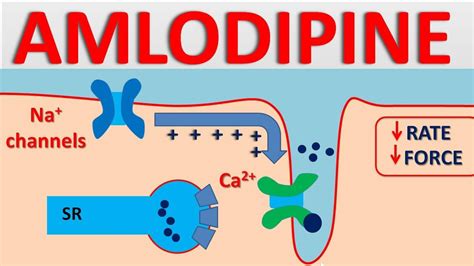Intro
Discover how Amlodipine Besylate works to lower blood pressure, reducing cardiovascular risks through its calcium channel blocking, vasodilating, and anti-hypertensive effects, improving heart health and overall wellbeing.
Amlodipine besylate, commonly known by its brand name Norvasc, is a medication primarily used to treat high blood pressure and coronary artery disease. Its effectiveness in managing these conditions has made it one of the most prescribed medications worldwide. Understanding how amlodipine besylate works is crucial for patients who are considering this medication or are already part of a treatment plan that includes it.
High blood pressure, or hypertension, is a significant risk factor for heart disease, stroke, and kidney disease. It occurs when the force of blood against the artery walls is too high, which can lead to damage over time. Coronary artery disease, on the other hand, involves the narrowing or blockage of the coronary arteries due to atherosclerosis, which is the buildup of cholesterol and fatty deposits (plaques) on the inner walls of the arteries. This condition can lead to chest pain (angina), shortness of breath, or other symptoms, and can increase the risk of heart attack.
Amlodipine besylate belongs to a class of medications known as calcium channel blockers. These drugs work by inhibiting the influx of calcium ions into cardiac and vascular smooth muscle cells during membrane depolarization of cardiac and vascular smooth muscles. The decrease in calcium influx leads to arterial dilation, which reduces blood pressure and increases oxygen delivery to the myocardium (heart muscle) while reducing the heart's workload.
How Amlodipine Besylate Lowers Blood Pressure

Benefits for Patients with Coronary Artery Disease
For patients with coronary artery disease, amlodipine besylate's ability to dilate coronary arteries is particularly beneficial. This dilation improves blood flow to the heart muscle, reducing the frequency and severity of angina attacks. The medication does not affect the heart rate at therapeutic doses, which is advantageous because it avoids the potential for reflex tachycardia (an increase in heart rate) that can occur with some other vasodilators.Working Mechanism of Amlodipine Besylate

Impact on Cardiovascular Health
The impact of amlodipine besylate on cardiovascular health is significant. By reducing blood pressure and improving blood flow to the heart, it decreases the workload on the heart, reducing the risk of heart failure. Additionally, the improved blood flow helps in reducing the severity of angina and the risk of heart attacks. For patients with hypertension, controlling blood pressure with medications like amlodipine besylate is crucial for preventing the long-term complications of high blood pressure, including kidney disease, heart failure, and stroke.Steps to Maximize the Effectiveness of Amlodipine Besylate

Practical Examples and Statistical Data
Studies have shown that amlodipine besylate is effective in reducing the risk of cardiovascular events. For example, the ALLHAT (Antihypertensive and Lipid-Lowering Treatment to Prevent Heart Attack Trial) study compared the effectiveness of different antihypertensive medications, including amlodipine besylate, and found that amlodipine was as effective as other medications in reducing the risk of cardiovascular events. Statistical data from such studies support the use of amlodipine besylate as a first-line treatment for hypertension and coronary artery disease.Amlodipine Besylate Side Effects and Precautions

Interactions with Other Medications
Amlodipine besylate can interact with other medications, altering their effects or increasing the risk of side effects. For example, it can interact with simvastatin, a cholesterol-lowering medication, to increase the risk of myopathy (muscle disease). Patients should provide their healthcare provider with a list of all their current medications to avoid potential interactions.Conclusion and Future Directions

Engaging with the Topic Further
For those interested in learning more about amlodipine besylate and its role in managing cardiovascular health, there are numerous resources available. Healthcare providers can offer personalized advice and guidance based on individual health needs. Additionally, reputable health websites and publications provide up-to-date information on the latest research and treatment options for hypertension and coronary artery disease.What is the primary use of amlodipine besylate?
+Amlodipine besylate is primarily used to treat high blood pressure and coronary artery disease.
How does amlodipine besylate work?
+Amlodipine besylate works by blocking calcium channels, which leads to the relaxation of blood vessel walls and a decrease in blood pressure.
What are the common side effects of amlodipine besylate?
+Common side effects include edema, dizziness, palpitations, and flushing. Less common but more serious side effects can include severe allergic reactions and changes in heart rhythm.
Can amlodipine besylate interact with other medications?
+Yes, amlodipine besylate can interact with other medications. Patients should inform their healthcare provider about all the medications they are taking to avoid potential interactions.
How can I maximize the effectiveness of amlodipine besylate?
+To maximize the effectiveness of amlodipine besylate, patients should take the medication as prescribed, monitor their blood pressure regularly, and maintain a healthy lifestyle, including a balanced diet and regular physical activity.
We invite you to share your thoughts and experiences with amlodipine besylate in the comments below. If you found this article informative, please consider sharing it with others who might benefit from this information. Your engagement helps us continue to provide valuable content on health and wellness topics.
